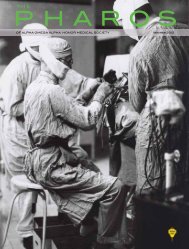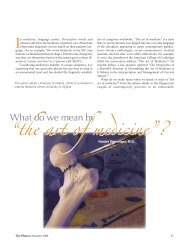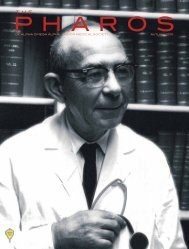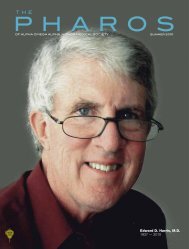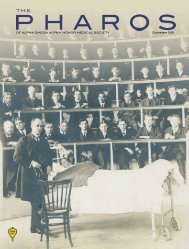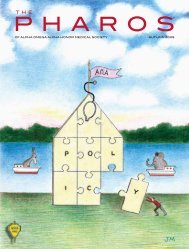The Pharos - Alpha Omega Alpha
The Pharos - Alpha Omega Alpha
The Pharos - Alpha Omega Alpha
Create successful ePaper yourself
Turn your PDF publications into a flip-book with our unique Google optimized e-Paper software.
serene, gazing purposefully at us with no<br />
response to our greetings. Neurologically<br />
he was intact but for the glaring exception<br />
of his mental status. Physically<br />
and biochemically, everything else was<br />
perfectly fine. <strong>The</strong> lights were on, but<br />
nobody was home. He was “medically<br />
stable, awaiting nursing home placement.”<br />
<strong>The</strong> only delay was for Social<br />
Security to certify him. That would trigger<br />
the nursing home’s acceptance, his<br />
removal from our list, and replacement<br />
with a more complex and educational<br />
patient.<br />
After four or five days of stopping at his<br />
bedside, we discovered that he had a fever.<br />
Not much, just a degree or two, below the<br />
threshhold of a “significant fever.” It was<br />
a teaching opportunity, the question of<br />
what is a “significant fever.” It has to do<br />
with the probability of sepsis, blood-borne<br />
infection, life-threatening infection. But<br />
“significance” is a relative term. <strong>The</strong> little<br />
fever made us stop and examine him a bit<br />
more, make sure there wasn’t something<br />
serious about him. It wasn’t much, but it<br />
might have been what began to change the<br />
way we looked at Mr. B.<br />
Eventually the fever went away with<br />
no treatment, and we decided he just<br />
had the cold that several team members<br />
and patients had suffered. It was the first<br />
thing we could see that we had in common<br />
with Mr. B. After all, he was a lonely<br />
black man with no apparent cognitive<br />
function: tragic, sad, hopeless. We were<br />
healthy white guys, smart and getting<br />
smarter, entrusted with the keys to the<br />
kingdom of life and health. In our best<br />
moments, we acknowledged our humility<br />
and humanity.<br />
I felt compassion for Mr B, at least as<br />
much as time allowed, but there didn’t<br />
seem to be anything we could do but<br />
feed and bathe and clothe him, and hope<br />
he could get out of the hospital before<br />
he caught something more serious than<br />
a cold. But the viral bonding was a start.<br />
Bidden or not, we had that in common.<br />
I tried harder to talk to him. He nodded<br />
yes and no to simple questions in a<br />
consistent way. <strong>The</strong>re were rare reports<br />
of a few words from his mouth, appropriate,<br />
to the point, but very simple. Still<br />
compatible with severe dementia, but a<br />
little more functional than we’d thought.<br />
Was he scared, intimidated as demented<br />
patients often are in an environment as<br />
strange as a hospital? Or had he been<br />
pretending some of this?<br />
<strong>The</strong>n came the call from the Feds.<br />
This guy was not at all who we thought<br />
he was. He hadn’t grown up here, somehow<br />
managing to get lost or estranged<br />
or otherwise separated from any human<br />
support. He was an immigrant, with an<br />
invalid Social Security number, an alien.<br />
It fit, his being an alien. Not just from<br />
Africa as they said, but maybe not from<br />
this planet, this solar system. It would<br />
explain why he ate styrofoam, or had<br />
that faraway look. Maybe he understood<br />
everything and this was part of the invasion<br />
strategy. What would be next?<br />
Okay, that was ridiculous, but who<br />
was this guy? Earlier I had run the record<br />
for proof that he really had a dementia.<br />
<strong>The</strong> multi-infarct diagnosis didn’t fit,<br />
because the strokes on his CT were in<br />
the wrong places to affect his thinking.<br />
But he did have the loss of brain tissue<br />
overall, and dementia was the best<br />
description of his state. <strong>The</strong> tests for<br />
treatable causes of dementia had been<br />
done, with an exception or two that we<br />
added, and all were negative—all, that is,<br />
but one. He had not had a spinal tap to<br />
examine his central nervous system for<br />
infection or other strange causes of his<br />
mental wipeout. So we did that too, and<br />
it was normal.<br />
But who was this guy? How had a<br />
solitary foreigner managed to get along<br />
in Birmingham, Alabama, and then end<br />
up like this? <strong>The</strong> little fever had started it<br />
but the Feds had fanned the flames. <strong>The</strong><br />
old records showed that a year ago he<br />
had been admitted when he showed up<br />
saying he was living on the streets and<br />
needing a place to stay. He got IV fluids<br />
and was sent back out twice. But—this<br />
guy surviving on the streets? That took<br />
a lot more skill and smarts than he had<br />
now. Obviously he’d lost a lot of function<br />
in just a year. How did he get here this<br />
time, where had he been?<br />
We found he’d been in a boarding<br />
home, and his landlady knew things. He<br />
had come to this country for graduate<br />
study and taught college mathematics.<br />
<strong>The</strong> rest was still a blur, but somehow,<br />
whether it was the dementia or something<br />
else, he’d fallen on terrible times<br />
that now looked like this. Was there<br />
redemption for Mr. B? Would the urbane<br />
members of the Faculty Club band together<br />
and rescue him? Was there a pot<br />
of gold at the end of this murky rainbow?<br />
Apparently not. We had come full circle.<br />
He was alone, unfunded, and hopeless—<br />
if hope is measured in the possibility<br />
for recovery of function, autonomous<br />
decision-making, or working crossword<br />
puzzles. He was after all a problem for<br />
the social workers and lawyers, a question<br />
of where his disposition for custodial<br />
care would be outside the hospital,<br />
a “dispo problem.” My compassion could<br />
not change that—or could it?<br />
Labels help a lot in medicine. <strong>The</strong>y<br />
categorize, prioritize, order our thinking.<br />
But they can close us off from the<br />
truth. Dementia can be reversible, but<br />
not for Mr. B. Dementia can be treatable,<br />
even for Mr. B. After all, it turns<br />
out he can communicate. What about<br />
prejudice: pre-judging—is that reversible?<br />
Treatable? We can re-examine diagnoses<br />
in our patients, but what if the<br />
processes already have gone too far for<br />
too long? <strong>The</strong> tissue damage can be relentless<br />
and eventually irreversible. What<br />
about the tissue of my own relationships,<br />
my own life? I can re-examine my attitudes<br />
and assumptions, but what if—like<br />
for Mr. B—the tissue of my relationships,<br />
the synapses of my connections, are far<br />
gone? Just as Mr. B is alone without<br />
connections, could I find myself cut off<br />
from the humanity that brought me into<br />
medicine? Why do this alone? What can<br />
I do about lost time? Is there a way for a<br />
thinking doctor to think about that?<br />
<strong>The</strong> author’s address is:<br />
Faculty Office Tower 720<br />
1530 3rd Avenue South<br />
Birmingham, Alabama 35294-3407<br />
E-mail: wcurry@uab.edu<br />
<strong>The</strong> <strong>Pharos</strong>/Autumn 2012 27




